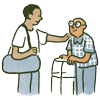Dementia care
Did you know that without the development of new treatments or a cure, the number of Australians living with dementia is expected to double in the next 25 years? That’s why Anglicare is committed to leading the way in this space for other providers.
If you are living with dementia, not only can we promise you excellent care, but also a variety of cutting-edge therapies which years of medical research has proven will be of benefit to you.
Where to find dementia care

In your home
When you choose Anglicare as your dementia care provider, you’ll become an active participant in your own care. We want to understand your wishes, so that we can offer you personalised support that allows you to keep on living your life meaningfully and exactly as you want to.
With our team of dementia experts, specialist dementia care workers, physiotherapists, occupational therapists and registered nurses, you can rest easy in the knowledge that your full spectrum of dementia care needs will be met, in your own home.

Centre-based respite and social support
therapeutic supports on offer, including art therapy, music therapy, exercise classes, and cognitively stimulating games. Enjoy freshly cooked and healthy meals tailored to your dietary requirements. There are also designated pick-up areas for transport to and from your centre.

In your residential aged care home
Dementia Advisory Services
The great thing about choosing Anglicare as your dementia care provider is that its Dementia Advisory Services offers a range of support, not only for you, but also to your family and primary carer.
Carer support groups
Run by dementia experts to offer your carer help and support on their caring journey.
Peer support groups
Meet others living with dementia who are facing similar challenges and who understand what you are experiencing. Learn new strategies and ways to manage the challenges you are facing.
Connection café
Regular get togethers at local cafés for people living with dementia and their carers. It’s your opportunity to form friendships with others in a similar situation to you, as well as speak to a dementia experts about your questions and any support you require.
Education sessions
Come along to learn useful strategies for living with dementia. It’s a chance for both you and your carer to your skills and hear about the latest dementia research.
Home visits
Book an assessment of your dementia care needs and receive personalised support strategies to improve your quality of life.
Advocacy
Get help accessing dementia services outside Anglicare that will be of benefit to you and your family.
Working towards dementia-friendly communities.
Anglicare is a proud member of the Western Sydney, Nepean, St George and Sutherland Shire Dementia Alliances.
The fight to end dementia
Anglicare first joined forces with KaRa MINDS, a neurological research lab, in 2012 to carry out a clinical study to identify those most at risk of dementia. At the time, the research was field-leading – the first of its kind to be conducted in a retirement village!
Today, Anglicare continues its commitment to support cutting-edge dementia research because we understand its great importance. Research leads to innovative, new treatments and therapies that will improve your quality of life. Research is the key to unlocking better ways to delay and, ultimately, end, dementia.


Inspired by the gospel of reconciliation in Jesus Christ, Anglicare's vision for reconciliation is a nation in which Australia's First Peoples are restored in dignity, respect, empowerment and opportunity.



